八年级英语人教版上册导学案:Unit 5 第二课时
新人教版八年级上册英语导学案(全册)
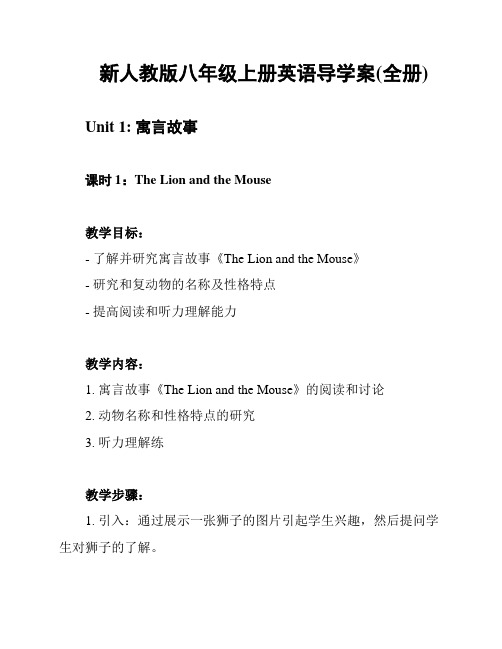
新人教版八年级上册英语导学案(全册) Unit 1: 寓言故事课时1:The Lion and the Mouse教学目标:- 了解并研究寓言故事《The Lion and the Mouse》- 研究和复动物的名称及性格特点- 提高阅读和听力理解能力教学内容:1. 寓言故事《The Lion and the Mouse》的阅读和讨论2. 动物名称和性格特点的研究3. 听力理解练教学步骤:1. 引入:通过展示一张狮子的图片引起学生兴趣,然后提问学生对狮子的了解。
2. 阅读故事:带领学生阅读寓言故事《The Lion and the Mouse》并注重理解故事情节。
3. 讨论问题:让学生回答关于故事的问题,例如:What did the lion do to the mouse? Why did the lion spare the mouse?4. 研究动物名称和性格特点:教授单词lion、mouse等动物名称,并让学生描述它们的性格特点。
5. 听力理解练:播放与故事相关的听力材料,要求学生听并回答问题。
作业:1. 抄写故事《The Lion and the Mouse》的关键句子。
2. 阅读课本上关于动物名称和性格特点的内容并做笔记。
Unit 2: 基础篮球技巧课时1:Dribbling教学目标:- 研究和掌握篮球运球的基本技巧- 提高身体的协调能力和手眼协调能力- 培养团队合作意识和体育精神教学内容:1. 篮球运球技巧的演示和解释2. 练篮球运球的基本动作3. 小组合作练教学步骤:1. 引入:向学生展示篮球运球的动作,并解释其重要性和应用场景。
2. 演示和解释:仔细演示篮球运球的基本技巧并解释每个动作的要点。
3. 练动作:让学生跟随教师一起练篮球运球的基本动作。
4. 小组合作练:将学生分成小组,进行篮球运球的练。
每个小组轮流进行练,其他组员观察并给予反馈。
作业:1. 回顾并练篮球运球的基本动作。
人教版八年级英语上册导学案(全册)

visit museums _______
Step C、考考你的迁移能力
1. Lucy usually______to school early. But today she ______to school late. (go)
2、运用一般过去时谈论过去的一天或一次旅行。
3.不规则动词过去式的归类记忆
【教学过程】
一、导入(启发探究3分钟)
StepA、试一试你能写出下列各词的过去式吗?
stay_________ do_________ stop_________play_________
is_________ go_______ buy_______ have _______
Step 1c
师生、生生操练
Where did you go on vacation? I went to New York City.
Did you go out with anyone? No, No one was here. Everyone was on vacation.
Did you buy anything special? Yes, I bought something for my father.
Step D、answer the questions:
How was your summer vacation ?
Where did you go on vacation?
Who did you go there with ?
What did you do there ?
二、自学(自主探究6分钟)
英语人教版八年级上册Unit5导学案
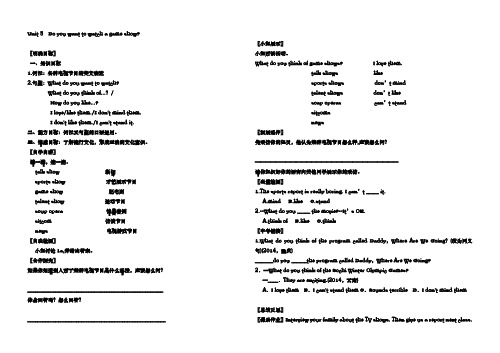
Unit 5 Do you want to watch a game show?〖明确目标〗一、知识目标1.词汇:各种电视节目的英文表达2.句型:What do you want to watch?What do you think of...?/How do you like...?I love/like them./I don't mind them.I don't like them./I can't stand it.二、能力目标:词汇及句型的口语运用。
三、情感目标:了解流行文化,形成正确的文化意识。
〖自学自研〗猜一猜,连一连。
talk show 新闻sports show 才艺展示节目game show 肥皂剧talent show 运动节目soup opera 情景喜剧sitcom 访谈节目news 电视游戏节目〖自我检测〗小组讨论1a,并给出答案。
〖合作探究〗如果你知道别人对于某种电视节目是什么看法,应该怎么问?_____________________________________________________ 你会回答吗?怎么回答?______________________________________________________ 〖小组展示〗小组对话活动。
What do you think of game shows? I love them.talk shows likesports shows don’t mindtalent shows don’t likesoap operas can’t standsitcomsnews〖拓展延伸〗先采访你的组员,他认为某种电视节目怎么样,应该怎么问?————————————————————————————请你组织好你的语言向其他同学展示你的采访。
〖当堂检测〗1.The sports report is really boring. I can’t _____ it.A.mindB.likeC.stand2.--What do you _____ the movie?--It’s OK.A.think ofB.likeC.think〖中考链接〗1.What do you think of the program called Daddy,Where Are We Going?(改为同义句)(2014,重庆)_______do you ______the program called Daddy,Where Are We Going?2.—What do you think of the Sochi Winter Olympic Games?—____.They are exciting.(2014,云南)A.I love them B.I can't stand them C.Sounds terrible D.I don't mind them〖总结反思〗〖课后作业〗Interview your family about the TV shows. Then give us a report next class.。
八年级上册英语unit5导学案
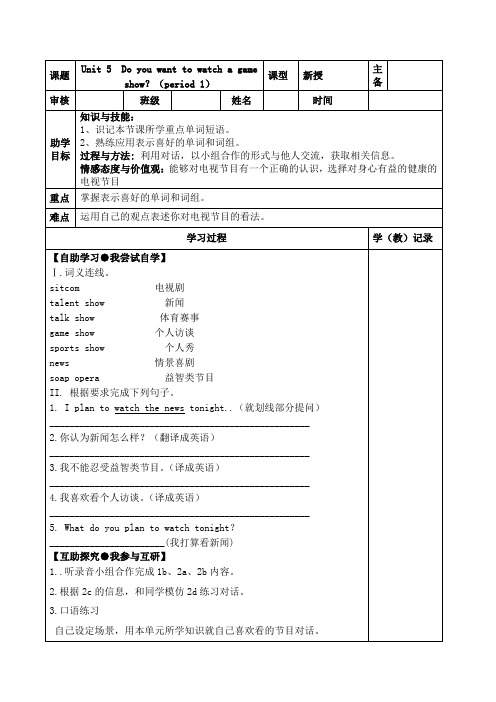
Ⅰ.单词词组翻译。
1.计划做某事___________2.期望做某事____________
3.like doing something _________4.想要做某事______________
II.根据要求完成下列句子。
1.Why do you like watching the news?(回答问题)
3.我不能忍受益智类节目。(译成英语)
____________________________________________________
4.我喜欢看个人访谈。(译成英语)
____________________________________________________
5. Whatdo you plan to watch tonight?
____________________________________________________
2.你认为新闻怎么样?(翻译成英语)
____________________________________________________
3.我今晚打算写作业。(译成英语)
____________________________________________________
_______________________(我打算看新闻)
【互助探究●我参与互研】
1..听录音小组合作完成1b、2a、2b内容。
2.根据2c的信息,和同学模仿2d练习对话。
3.口语练习
自己设定场景,用本单元所学知识就自己喜欢看的节目对话。
【求助交流●我愿意分享】
我学到了新的短语和句子
【补助练兵●我能用新知】
八年级英语上册unit5知识精讲导学案(人教新目标)
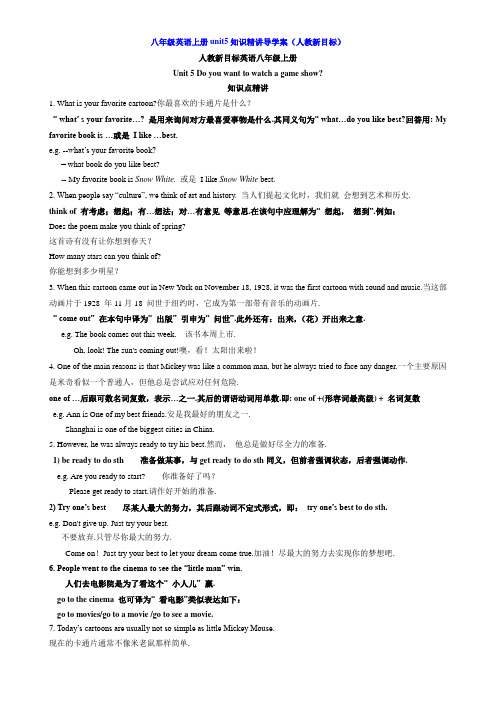
八年级英语上册unit5知识精讲导学案(人教新目标)人教新目标英语八年级上册Unit 5 Do you want to watch a game show?知识点精讲1. What is your favorite cartoon?你最喜欢的卡通片是什么?“ what’ s your favorite…? 是用来询问对方最喜爱事物是什么.其同义句为“ what…do you like best?回答用: My favorite book is …或是I like …best.e.g. --what’s your favorite book?= what book do you like best?-- My favorite book is Snow White. 或是I like Snow White best.2. When people say “culture”, we think of art and history.当人们提起文化时,我们就会想到艺术和历史.think of 有考虑;想起;有…想法;对…有意见等意思.在该句中应理解为“ 想起,想到”.例如:Does the poem make you think of spring?这首诗有没有让你想到春天?How many stars can you think of?你能想到多少明星?3. When this cartoon came out in New York on November 18, 1928, it was the first cartoon with sound and music.当这部动画片于1928 年11月18 问世于纽约时,它成为第一部带有音乐的动画片.“come out” 在本句中译为“ 出版” 引申为“ 问世”.此外还有:出来,(花)开出来之意.e.g. The book comes out this week. 该书本周上市.Oh, look! The sun's coming out!噢,看!太阳出来啦!4. One of the main reasons is that Mickey was like a common man, but he always tried to face any danger.一个主要原因是米奇看似一个普通人,但他总是尝试应对任何危险.one of …后跟可数名词复数,表示…之一.其后的谓语动词用单数.即: one of +(形容词最高级) + 名词复数e.g. Ann is One of my best friends.安是我最好的朋友之一.Shanghai is one of the biggest cities in China.5. However, he was always ready to try his best.然而,他总是做好尽全力的准备.1) be ready to do sth 准备做某事,与get ready to do sth同义,但前者强调状态,后者强调动作.e.g. Are you ready to start? 你准备好了吗?Please get ready to start.请作好开始的准备.2) Try one’s best 尽某人最大的努力,其后跟动词不定式形式,即:try one’s best to do sth.e.g. Don't give up. Just try your best.不要放弃.只管尽你最大的努力.Come on!Just try your best to let your dream come true.加油!尽最大的努力去实现你的梦想吧.6. People went to the cinema to see the “little man” win.人们去电影院是为了看这个“ 小人儿” 赢.go to the cinema 也可译为“ 看电影”类似表达如下:go to movies/go to a movie /go to see a movie.7. Today’s cartoons are usually not so simple as little Mickey Mouse.现在的卡通片通常不像米老鼠那样简单.此句中not so… as 结构表示“ 不像……那样……; 不如……这么……”.又如:It wasn’t so good as last time. 这次不如上次好.It is not so easy as you’d think. 这不像你想的那样简单.8. She dresses up like a boy and takes her father’s place to fight in the army.她女扮男装,替父上战场打仗.1)dress up “盛装打扮、乔装打扮”.e.g. I’d like you to dress up for my birthday party tonight.今晚我希望你为我的生日派对打扮打扮.Young kids often dress up and have fun at Halloween.万圣节前夜,小孩子通常都乔装打扮,玩得很开心.2)take one’s place 取代某人的位置,顶替.Mulan takes her father’s place to fight in the army.take sb’s place to do sth. 替代某人的位置做某事2. They did a good job in the movie.他们在电影中表演出色.do a good job 好好干;干得好; 干得出色e.g. I'm sure you can do a better job next time.我相信你下次会干得更好.You've done a good job of it. 你干得太漂亮了!9. joke名词玩笑,笑话;笑柄.讲笑话“tell a joke/jokes”当做动词:开玩笑(+about/with);开...的玩笑,戏弄. 例如:He’s the joke of the whole village.他是全村的笑柄.I’m only joking. 我只是开玩笑而已.【针对练习】Don’t take my little ________ too seriously. I’m only ___________.A. joke; jokeB. joke; jokingC. joking; jokeD. joking; joking10. What comedy shows do you like to watch?comedy喜剧,喜剧片;复数形式为comedies.例如:Lost in Thailand(泰囧) is a comedy.【针对练习】—What do you think of the ______________? —I don’t mind them.A. comediesB. comedyC. comedysD. comedyes11. How about you?how about和what about同义,用法也相同.About是介词,后面除了名词,代词以外,还可以跟动名词或介词短语.how/what about用来询问或打听情况,或用来提出请求,建议或征求意见,意思为“…怎么样?”“…如何?”例如:I am tired. What about you? 我很累了,你呢?How about going out for a walk? 出去散步怎么样?【课堂探究】12. What do you think of soap operas? 你认为肥皂剧怎么样?What do / does + sb. + think of ...? 意为“某人认为……怎么样?”,用来询问对方对某人或某物的观点或看法,相当于How do / does sb. like ...? 但要注意,这两句中的what与how不可混用.例如:What do you think of this book?同义句为How do you like this book?【针对练习】你认为这本书怎么样?_________ do they__________ the movie “Home Alone”?A. How; likeB. What; likeC. What; think ofD. How; think of13. stand意为“忍受(疼痛、侮辱、艰难等)”,常用在否定句中.例如:I can’t stand that performer. 我不能容忍那个演员.stand后还可以接V-ing形式或动词不定式.例如:I can’t stand waiting / to wait any longer. 我不能忍受再等下去.14. mind用作动词时,意为“介意”,后接名词、代词或动名词.例如:I don’t mind them. 我不介意它们.“Would you mind (not) doing sth.?”用来委婉请求他人(不要)做某事.如:Would you mind not smoking here? 你介意不要在这儿吸烟吗?【课堂探究】15. meaningless 形容词,意为“毫无意义的;意思不明确的”. 反义词为:meaningful意味深长的,由meaning+后缀less构成.一般名词后加less后缀构成形容词.意为:没有,无.例词:careless 粗心的;friendless 没有朋友的;helpless无助的;homeless无家可归的【针对练习】1) The book is __________ to him, so he doesn’t like it.A. meaninglessB. meaningfulC. meaningD. mean2) After Ya’an earthquake, many people become ______________. We should help them.A. homeB. homelessC. happyD. happily【课堂探究】16. famous是形容词;词组“be famous for”表示人“以某种知识技能,作品或特征而出名”,表示某地“以某种特产或特征出名”,或表示某事“以其内容、特征、价值等而被人所知”.例如:He is famous for his skill in playing football. 他因球艺而出名.Mark Twin was famous as a children-story writer. 马克·吐温作为儿童故事作家而著称.【针对练习】1) 杭州以产绿茶而著称.Hangzhou _______ ________ _______ its green tea.2) Yao Ming is ____________ being a basketball player.A. famous forB. famous asC. famousD. famous to17. successful为形容词,意思为“达到目的,有成效的;获得成功的,有成就的.例如:be successful in sth/doing sth;be successful at sth/doing sth;a successful actor 有成就的演员.18. find 与find out 的区别find 意为“找到;发现”,强调动作的结果.e.g. Mr. Li found his lost keys in the library.李老师在图书馆里找到了他丢失的钥匙.find out查明; 弄清(指通过调查、研究等方式查明事情的真相)e.g. Did they find out where the old man lived ?他们查明那位老人住在哪里了吗?19. plan to do sth. 计划/打算做某事We plan to have a birthday party for Mary.20. hope to do sth. 希望做某事(能实现的理想)They hope to take the plane to Beijing next year.他们希望来年乘飞机去北京.21. expect to do sth期待做某事III. 根据汉语提示完成英语句子.1. 她无法忍受体育节目.________________________________________________________________________________ 2. 你介意情景剧吗?________________________________________________________________________________ 3. 我哥哥喜欢体育世界而我姐姐喜欢情景喜剧.________________________________________________________________________________ 4. —你觉得游戏节目怎么样?—我忍受不了.----________________________________________________________________________________ ----________________________________________________________________________________ 5. 有一天我想成为电视台记者.________________________________________________________________________________ 6. 今晚我打算看体育世界.________________________________________________________________________________ 7. 她期待有一天去参观北京.________________________________________________________________________________ 8. 你认为济南的天气怎么样?________________________________________________________________________________ 9. 她喜欢看什么样的喜剧节目?________________________________________________________________________________ 10. 我的妹妹不能忍受新闻节目.________________________________________________________________________________ 11. 我弟弟喜欢看卡通片.________________________________________________________________________________ 12. 我爷爷喜欢访谈节目是因为有教育意义.________________________________________________________________________________ 13. 李连杰演了很多动作片.(make)________________________________________________________________________________ 14. 20世纪三十年代,他以米老鼠为原形制作了87部卡通片.________________________________________________________________________________ 15. 雷锋总是时刻准备着帮助别人.________________________________________________________________________________ 16. 谁有一对比Mickey还出名的耳朵呢?________________________________________________________________________________ 17. 一些人也许会问这个卡通动物如何变得这么受欢迎.________________________________________________________________________________ 18. 你能想出和Mickey一样著名的卡通人物吗?________________________________________________________________________________19. 这部电影表达了木兰对家人,朋友还有国家的爱.________________________________________________________________________________ 20. 我认为那名女演员把木兰这个角色演绎得非常好.________________________________________________________________________________ 21. 如果你打算看些让人高兴的节目,选择Happy Camp.________________________________________________________________________________ 22. 在圣诞节那天,他常打扮成圣诞老人的模样.________________________________________________________________________________ 23. —我已经做完了作业. —做得非常好.—________________________________________________________________________________ —________________________________________________________________________________。
人教版英语八年级上册Unit 5 导学案及答案

Unit5:Do you want to watch a game show ?Section A一、单词、短语、句型默写1、情景喜剧2、新闻节目、新闻3、肥皂剧4、介意、头脑、心智5、忍受、站立6、教育的、有教育意义的7、打算、计划8、希望9、查明、弄清10、讨论、商量11、发生、出现12、预料、期待13、笑话、玩笑14、喜剧、喜剧片15、看游戏节目16、谈话节目17、运动节目18、才艺节目19、你认为谈话节目怎么样?20、看新闻21、一点点枯燥22、向/从......学习23、更有教育意义24、问题的答案25、看情景喜剧是放松的很好的方式。
26、我不能忍受肥皂剧。
27、我不介意它们。
28、我希望找出世界各地发生了什么事情。
29、开展关于......的讨论30、我最喜欢的电视剧节目31、我希望有一天成为电视台记者。
二、单元语法讲练动词不定式是动词的一种非谓语形式,,其结构是“to+动词原形”,动词不定式的否定形式是在to前面加上not(即not+to+动词原形)。
动词不定式的用法如下:1、作主语:动词不定式作主语通常用it来作形式主语,而把动词不定式结构放在句子后面。
常见句型:It’s +形容词+for sb +to do sth .(翻译)喂养动物是我的工作。
对于我们来说早上读英语是很重要的。
2、作宾语或宾语补足语:即两个动词在一个句子中前后通常用to连接,to后跟动词原形。
注意:动词不定式的否定形式是在to前面加上not。
(翻译)他想去购物。
他想要我保持房间整洁。
我决定了什么时候去旅行。
他要求我在上学的日子不要看电视。
注意:(1)一听(hear)二看(see、watch)三使让(make、let)后跟动词原形不加to。
I hope I can make my dream (come) true one day . I saw them(bring)out the best in them on TV yesterday .(2)有些动词如like、love、enjoy、spend、finish、keep、mind、practice等后面的动词只能接动词ing形式。
人教版八年级英语上册_上册全册教案教学设计导学案

Unit 1 Where did you go on vacation? 单元总览课时分解第一课时 Section A (1a ~ 2d )§自主学习方案学生自学新单词(教材P 的单词),看谁记得又快根据首字母及汉语提示完成句子。
1. He told her not to tell anyone.2. There had never been such a beautiful woman anywhere in the world.3. This world is a wonderful place.4.Only a few people here know his name.5. On Sunday, I like staying at home most of the time to watch TV .6. Quite a few (相当多)students were late this morning.§课堂导学方案Step 1 情景导入 参考案例Teacher: What did you do last Sunday? Students: …Teacher: Today we are going to learn how to talk about past events.环节说明:从询问全班学生的度假情况入手,让学生初步理解对过去事情的谈论,以及其基本结构。
激发学生学习本单元的兴趣,自然地导入新课。
Step 2 完成教材1a-1c 的任务 【操作案例】1. 要求学生翻开课本P1,理解1a 中单词或短语的意思,并按要求完成课本上相应的任务。
(1分钟) Teacher: What at can you see ?Each picture shows something a person did in the past .Now, please match each phrase with one of the pictures .2. 检查答案,先要求几名同学给出他们的不同意见,并全班一起讨论。
人教版八年级英语上册Unit5 Do you want to watch a game show教案
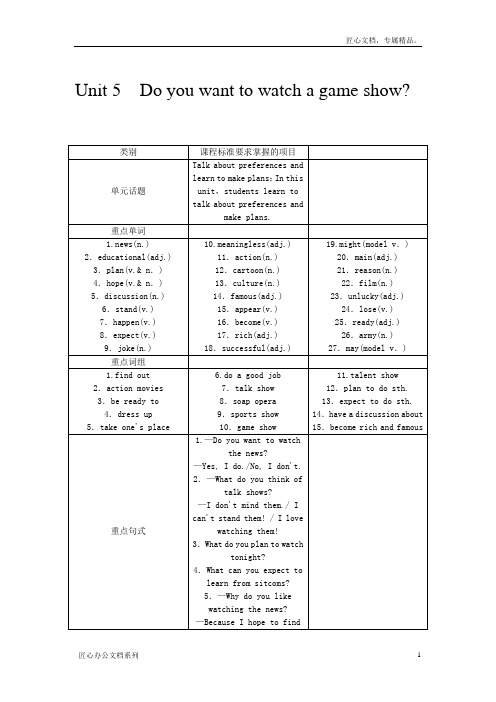
Unit 5Do you want to watch a game show?第一课时Section A (1a~1c)§自主学习案根据句意及首字母提示完成单词。
1.Do you like watching s oap operas?2.S itcom always makes me funny.3.Mr.Lee watches morning n ews every day.4.I can't s tand watching game shows.5.She doesn't m ind watching sports shows with him.§课堂导学案Step 1准备与热身(Preparation)Hello, everyone.Today we are going to talk about TV programs.Before we start , I will ask you some questions.What did you do last night? I know many of you watched TV. But different people like different kinds of programs, right? Now we're going to talk about different programs.Step 2呈现与输入(Presentation)Can you tell about different shows you know? Yes,let's learn what they are.talk show,soap opera, sports show, sitcom, game show ,talent show, news…There are some new words we don't know. Let's see what their meanings are.soap opera 肥皂剧; sitcom 情景喜剧If you want to know whether someone likes or doesn't like the program, you can ask like “What do you think of …?”“Do you like /love …?”If you want to answer the questions, you can use these words:love, like, don't mind, can't stand,don't love/like.Look at the seven pictures in 1a.Can you guess what shows they are? And then match the TV shows with the pictures.Step 3练习与体验(Practice)Jack and Mark are talking about TV shows. Listen to the tape and number the shows (1~4) in the order you hear them.Listen to the tape and try to find out “What does Mark say about TV shows?”Listen again and write a letter a~e from activity 1a.1.__a__ loves2.__b__ likes3.__c__ doesn't mind4.__d__ doesn't like5.__e__ can't standSomeone likes watching TV.They think TV shows are very interesting.But their favorite programs are different.Let's practice the conversation below.A:What do you want to watch?B:What do you think of talk shows?A:They're OK.I don't mind them.B:Then let's watch a talk show.Then make your own conversations to express your opinion.Step 4运用与生成(Production)T:Imagine you're a host from a TV station.You want to learn about what the students think of your TV shows.Please make a survey and interview three or four students what they think of and why.Give you three minutes to prepare and then act out your conversations before class. Are you ready? Now begin.(The students may look for the partners they like to make a conversation.) T:Which group wants to act it out first?Ss:…(Ask two more groups to act out their conversations.)S1:I think the first group is the best .Because they speak loudly and clearly.S2:I think … (Let the students give some advice and choose the best group.) Step 5巩固与提高(Progress)【探究点】What do you think of talk shows?你认为脱口秀节目怎样?What do you think of…?=How do you like…?常用来询问对方的意见或看法,意为“你认为……怎么样?”或“你觉得……怎么样?”。
- 1、下载文档前请自行甄别文档内容的完整性,平台不提供额外的编辑、内容补充、找答案等附加服务。
- 2、"仅部分预览"的文档,不可在线预览部分如存在完整性等问题,可反馈申请退款(可完整预览的文档不适用该条件!)。
- 3、如文档侵犯您的权益,请联系客服反馈,我们会尽快为您处理(人工客服工作时间:9:00-18:30)。
第二课时Section A(3a~3c) 知识目标
类别课时要点
重点单词joke(n.)玩笑;笑话comedy(n.)喜剧片;喜剧
重点词组want to do sth.想做某事hope to do sth.希望做某事expect to do sth.期望做某事plan to do sth.计划做某事
课堂环节
§自主学习方案
学生自学新单词(教材P35的单词),看谁记得又快又准。
(1分钟)
1. joke 玩笑
2. comedy 喜剧片
3. plan to do sth 计划做某事
4. hope to do sth 希望做某事
5. expect to do sth 期望做某事
【新词自查】
根据句意及汉语提示完成句子。
1.The old man told us some funny jokes (笑话)and made us laugh.
2.I expect(期望) to learn the news about the earthquake in Ya An on TV.
3.I am planning(打算) to watch a soap opera tonight.
4.My sister hopes(希望)to be a teacher when she grows up.
§课堂导学方案
Step 1 情景导入
参考案例
本课时主要是通过读写对话练习,让学生进一步掌握动词不定式作宾语的用法。
因此上课前教师可以让学生先自己预习“Grammar Focus ”中的句子,体会不同的动词不定式短语的句型。
(3分钟)
环节说明:通过预习,学生掌握动词不定式作宾语的句型。
从而为3a的完成打下基础。
Step 2完成教材3a的任务
【操作案例】
1.要求学生快速默读并完成课本3a的对话填空任务。
然后邀请几位同学给出自己的答案,全班一起检查讨论(同学们可根据自己的喜好自由作答)。
(2分钟)
2.巩固练习。
让学生两人为一组,分角色表演自己的对话。
(3分钟)
A:What do you plan to watch on TV tonight?
B: I hope to________ ,but I also want to_______ .How about you?Do you __________ a talk show or ________? A: Oh,I want to _______.
Step 3完成教材3b~3c的任务
【操作案例】
1.要求学生根据课文中给出的问题,根据自己的实际情况给出合理的答案完成3b的任务。
然后邀请几位同学读出自己的句子。
如果出错让别的同学指出来。
(2分钟)
2.要求学生与同伴根据自己所写的句子做结对练习,然后邀请几位同学读出自己的答案。
(2分钟)
3.要求学生在小组中讨论自己喜爱的电视和电影节目,然后完成3c中的表格。
(3分钟)
4.要求学生根据自己小组的讨论结果整理出一个小报告。
然后让学生相互检查,查找里面的错误。
然后从每组中邀请一位同学读一下自己的报告。
(5分钟) 环节说明:将听、说、读、写的任务结合起来,不仅锻炼了学生的语言综合运用能力,还巩固了学生对目标语言的学习、识记和运用。
§当堂评价方案(详见当堂训练部分)。
